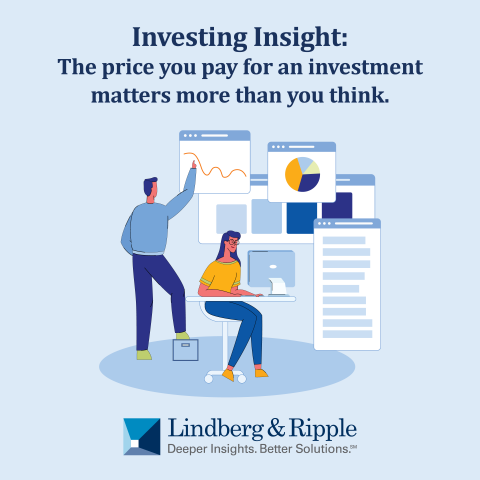
The Price You Pay: Lessons in Value Investing from Private Equity to Global Markets
In the world of investing, the price you pay can make or break your portfolio. This timeless lesson resonates from the halls of private equity to the global stock markets. At Lindberg & Ripple, we often see clients drawn to flashy headlines and rapid-growth companies. But the truth is, even the greatest business in the world can become a poor investment if the price is too high.
The Private Equity Perspective
One of our clients in private equity recently purchased his sixth company. His success mirrors the long-term approach of firms like Berkshire Hathaway, focusing on acquiring quality businesses. However, he is quick to highlight that the key is not just the quality of the business—it is the price you pay.
In private equity, the margins are razor-thin. Overpaying, even for a stellar business, can lead to losses. Conversely, a less-than-perfect company bought at the right price can deliver significant returns over time. This principle applies broadly to all investing, regardless of asset class.
The Danger of Overpaying
History offers plenty of cautionary tales. Consider Microsoft, which grew its revenue by double digits for years. Despite that growth, its stock price stagnated for over a decade because it started from an excessively high valuation. Cisco, another tech giant, generates significantly more revenue today than it did during the dot-com bubble, but its stock price remains below those early-2000s highs.
The problem? Investors bought in at sky-high valuations, effectively betting on infinite growth. When a company is trading at 30 times earnings, you are assuming not only growth but extraordinary, sustained growth. That is a risky assumption, no matter how promising the business appears.
International Markets: Value Hiding in Plain Sight
While U.S. markets often capture headlines, international markets deserve a closer look. Europe, for example, has faced economic struggles, but starting valuations are much lower. Dividend yields are higher, and investors may find opportunities to buy great companies at bargain prices.
It is easy to write off international investing as “dead” in the face of global economic uncertainty. But as history shows, when prices drop low enough, even lackluster markets can become attractive.
Lessons from the Past
The “Nifty Fifty” stocks of the 1970s, the tech bubble of the early 2000s, and today’s high-growth companies like Nvidia all illustrate the same point: no investment is immune to overvaluation. Even giants like Google, Meta, and Amazon—once seen as untouchable—are facing pressures today that could affect their long-term trajectories.
This is not to say these are not great businesses. But as investors, we must ask, “How much more growth can we realistically expect?” Walmart and Costco, for example, are quietly growing faster than Apple in some respects. The lesson? Growth stories are not always where you think they are.
The Bottom Line: Take a Broader View
At Lindberg & Ripple, we advocate for a disciplined, value-driven approach. Instead of chasing trends or trying to time the market, focus on finding investments that offer long-term value. This often means looking beyond the obvious—exploring international markets, overlooked sectors, or even companies in transition.
Remember, there is no such thing as a “bad” investment if the price is right. Similarly, there is no such thing as a “good” investment if you overpay. The goal is to invest in quality businesses at reasonable valuations and to maintain a broad, long-term perspective.
History has shown time and again that markets are unpredictable. Nobody knows what happens next—not with Nvidia, not with tech, not with international markets. But what we do know is that finding value and staying disciplined is a strategy that stands the test of time.
For further details regarding the securities relationship with M Holdings Securities, Inc.please go to mfin.com/DisclosureStatement.htm. For important information related to M Securities, refer to the M Securities’ Client Relationship Summary (Form CRS) here.
For important information related to Lindberg & Ripple, refer to the Lindberg & Ripple Client Relationship Summary (Form CRS) found here.
Registered Representatives are registered to conduct securities business and licensed to conduct insurance business in limited states. Response to, or contact with, residents of other states will only be made upon compliance with applicable licensing and registration requirements. The information in this website is for U.S. residents only and does not constitute an offer to sell, or a solicitation of an offer to purchase brokerage services to persons outside of the United States.
This site is for information purposes and should not be construed as legal or tax advice and is not intended to replace the advice of a qualified attorney, financial or tax advisor or plan provider.
CA Insurance License # 390636
File # X
